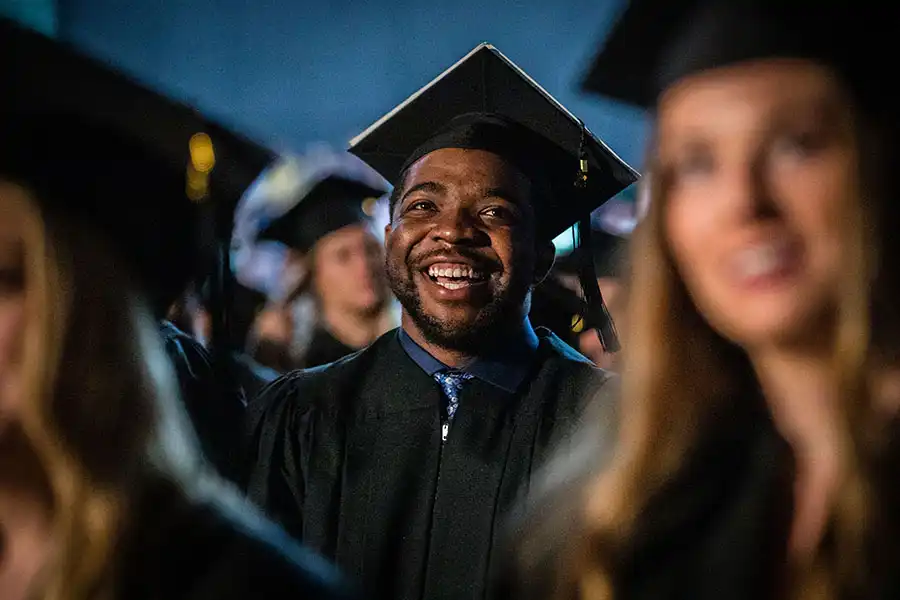Program(s) Available: B.A., Minor
Are you passionate about music? Do you want to learn the ins and outs of how music works? You may be the perfect fit for our music major. This comprehensive major is perfect for those who want to take a broad approach to their music education. Students also have the option to personalize their education by specializing in audio production, business and wellness. Keep reading to see where you fit best!
The comprehensive music degree is a great option for students seeking a general approach to their music education. This option provides students with a solid understanding of music composition and theory, as well as experience participating in musical ensembles on campus.
Here are just a few examples of the courses you’ll take:
Do you enjoy the technical side of music? You could be a good candidate for this program. Our audio production emphasis centers around the digital framework needed for successful audio production. You’ll gain valuable music production experience as well as a plethora of opportunities to master the equipment and technology behind production.
Here are just a few examples of the courses you’ll take:
Students interested in combining the worlds of business and music together are encouraged to consider this program. A major in music with an emphasis in business provides a foundational education fit for all musical and entrepreneurial-minded individuals. This track is especially great for students looking to pursue a career in arts and music management, entrepreneurship, studio teaching and management and more.
Here are just a few examples of the courses you’ll take:
If you’re passionate about music and the overall health benefits it can provide, you may enjoy our wellness emphasis. This path prepares students for a successful career in counseling, music therapy, studio teaching and more. A popular career path with this degree is music therapy, which blends the worlds of wellness and music together for a fulfilling career choice.
Here are just a few examples of the courses you’ll take:
Students interested in music are encouraged to consider our music minor, even if the end goal doesn't involve teaching or becoming a music professional. For example, if your hope someday is to write web content for a music-related non-for profit, tacking a music minor on to your writing degree would be a great idea.
This minor program teaches students the fundamentals of sight singing and ear training, the theory of music and the literature and history of music. After taking the required courses, students can customize their minor from a list of approved electives.
Here are just a few examples of the courses you’ll take:
Thu, April 9, 2026
(secondary education / music education)
School of Fine and Performing Arts
660.562.1326
fparts@nwmissouri.edu
As a music major, you’ll gain all the skills and confidence needed to lead a successful music career someday. Here are just a couple examples of the careers you could land with this degree.
Specific careers for Music include:

The Department of Fine and Performing Arts offers several scholarship opportunities to incoming students, regardless of major. Thanks to Northwest’s scholarship stacking policy – a policy that allows students to stack admissions-based scholarships with music scholarships – the financial support is endless. Now you can focus on what really matters, which is developing your music expertise and paving the path to a successful career! Search music-related scholarships or browse all aid below.

Vocal ensembles include University Chorale, Tower Choir, Concert Choir and musical theatre.
Instrumental ensembles include the Bearcat Marching Band, Bearcat Pep Band, Wind Symphony, Symphonic Band, Jazz Ensemble, Studio Jazz Ensemble and chamber ensembles.
Many Northwest students are involved in a club or organization on campus. Join groups like Sigma Alpha Iota or Phi Mu Alpha to gain new friendships and clock in those volunteer hours that employers love to see on a resume!










“With this degree, I get to be a role model for future students, and that is a really rewarding feeling and experience.”
Dalton Haberman| Instrumental Music Teacher, Platte City Middle School | Instrumental Music Education (2017)

Our music faculty are experts in their field and bring tons of unique teaching experience to the classroom. They bring both academic expertise and real-world musical experience to the table, providing personalized mentorship to help you land a teaching job after graduation!
No. Scholarships are open to anyone - not just music education majors! Performance scholarships are awarded on the basis of music auditions and academic achievement. You may be expected to submit an audition tape to be considered for certain music scholarships.
While our music education program certifies students to teach music in a K-12 classroom, the music major does not. This major centers on the general foundation of music; students interested in teaching music in a classroom should check out our music education program.
Students who want to incorporate music into their future career to some capacity are encouraged to pursue this minor. Oftentimes, students who know they love music but don’t necessarily want to teach are great candidates. A minor in music is also a great safety net if you decide to pursue music full-time someday!
A cumulative list of first-year, admissions-based undergraduate student scholarships can be found on the Office of Financial Aid website. Music-specific scholarships are awarded based on academic achievement and music auditions. For specific information about music scholarships, students are encouraged to reach out to a Northwest music faculty member or by emailing the Department of Fine and Performing Arts at fparts@nwmissouri.edu.
Note: Northwest advisors work with each student to ensure their requirements are met through provision of additional coursework. Students who live in a state where Northwest programming is not accepted can attest that they will seek employment in a state that it is accepted.
Related Majors |
Latest Blogs |